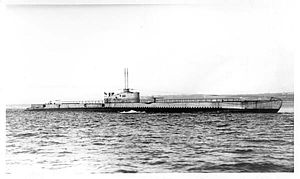1500 tons-class submarine (1931)

A first class 1500-ton submarine
|
|
| Class overview | |
|---|---|
| Name: | First Class Submarines 1500-ton type |
| Operators: |
|
| Subclasses: |
|
| Completed: | 31 |
| Lost: | 26 |
| Retired: | 5 |
| General characteristics | |
| Type: | Submarine |
| Displacement: | |
| Length: | 92.3 m (302 ft 10 in) |
| Beam: | 8.2 m (26 ft 11 in) |
| Draught: | 4.9 m (16 ft 1 in) |
| Propulsion: |
|
| Speed: |
|
| Range: |
|
| Test depth: | 80 m (260 ft) |
| Complement: |
|
| Armament: |
|
The 1500 ton-class submarines (French: ), also referred to as First Class submarines ) were 31 oceanic submarines with classic propulsion built in France between 1924 and 1937 for the French Navy and served during the Second World War. They were designated as large submarine cruisers and referred to as the 1500 ton-class submarines by the French Navy and sometimes designated as the Redoutable-class in reference to the lead boat of the 1500 tons class series, the submarine Le Redoutable Q136 (in service from 1931 to 1942). The 1500-ton class unit submarines were divided into two sub-class series, Type I were known as (Le Redoutable) and Type II (Pascal).
Modern submarines during their conception, they were quickly outdated at the beginning of Second World War, while not being able to be modernized due to the conditions of the armistice imposed upon the Vichy government. Accordingly, 24 out of the 29 units engaged were lost during the conflict. After having protected the Second French colonial empire at the service of the Vichy Regime against the British offensives at Dakar , Libreville or Madagascar at the cost of heavy losses, the units of the 1500-ton class came under control of the Allies after the latter landed in North Africa. Except for Casabianca, which was notable during the liberation of Corsica, these submarines participated little in remainder of the conflict, due to their scheduled refitting and alterations done in the United States between February 1943 and March 1945. Then becoming training units, the last submarines of the 1500-ton class were disarmed in 1952.
...
Wikipedia

